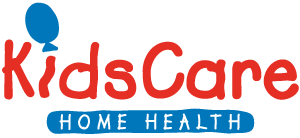
Pediatric home health therapy involves providing therapy services, such as speech, occupational, or physical therapy to children and families in the comfort of their own homes. Home health therapy for children offers numerous benefits – from more opportunities for caregivers to get involved to an overall reduction of stress and anxiety for children.
Recognizing the importance of these benefits led to the creation of KidsCare Home Health in 2003. Founder Cortney Baker, a speech-language pathologist, believed therapy is most effective when conducted one-to-one in a familiar environment that includes family members and caregivers. Since then, KidsCare Home Health has grown to include hundreds of speech, physical, and occupational therapists, nurses, and patients across branches throughout the U.S.
As the name indicates, pediatric home health therapists work with children in the patient’s home rather than in a medical office, hospital, or outpatient facility. However, to truly understand what a career in pediatric home health is all about, it’s helpful to know how a typical day looks.
So, we caught up with three KidsCare Home Health therapists to get a peek behind the scenes of working in pediatric home health therapy. We asked each to describe a typical day, including responsibilities, challenges, and perks.
If you are interested in pursuing a career in pediatric physical, occupational, or speech therapy, this article will give you an overview of each practice and a clear picture of what working in home health therapy entails.
Average Day of a Home Health Physical Therapist
A physical therapy career typically involves working in an outpatient clinic, a hospital, a skilled nursing facility (SNF), an inpatient rehab facility – or a patient’s home. Every situation is going to look different and will offer advantages and disadvantages.
So what happens in a typical day with home health or home care physical therapy jobs? To find out, we spoke with Karli about her job as a KidsCare Home Health physical therapist.
Daily Home Health Physical Therapist Responsibilities
Karli spends her days as a pediatric home health physical therapist confirming schedules with caregivers, driving to/completing scheduled routine visits and evaluations with patients, cleaning toys, documenting visits, updating patient goals, researching diagnoses/interventions/resources, creating home exercise plans, and lots of play! She also communicates regularly (either by phone or email) with doctors, medical equipment/orthotics companies, shared therapists, and KidsCare office staff. She sees between 7-9 patients in a typical day.
Karli also shared tips on how she makes her day “smoother”, such as:
- Providing monthly calendars to caregivers so they do not require daily reminders
- Utilize a hour by hour daily planner with removal name tags to schedule/reschedule patient visits easily
- Organize word document bank of verbiage frequently used during routine visits and evaluations for documentation purposes
- Keep a running document of beneficial resources for my families.
Most Fulfilling Part of the Day of a Home Health Physical Therapist
 She describes the most fulfilling part of being a pediatric home health physical therapist as advocating for and empowering the kids she works with and their families. She enjoys seeing patients meet goals and hit milestones; however, more than anything, Karli loves seeing what they gained in “their own words” rather than the words she wrote within an official plan of care.
She describes the most fulfilling part of being a pediatric home health physical therapist as advocating for and empowering the kids she works with and their families. She enjoys seeing patients meet goals and hit milestones; however, more than anything, Karli loves seeing what they gained in “their own words” rather than the words she wrote within an official plan of care.
“As a home health therapist, we have a unique opportunity to meet a child within their natural environment and allow our skill set to collide head on with their individualized needs to better their performance in their specific home and community.“
Biggest Difficulties of a Home Health Physical Therapy Job
One of the biggest challenges Karli faced with other home health physical therapy jobs was not having frequent “in-person” interaction with and feedback from other therapists. However, that changed when she joined KidsCare.
“They have the BEST team that allows you to be active in multiple avenues of communication to connect and collaborate with other therapists within the company to share ideas, ask questions, and navigate life as a pediatric therapist!” she explains.
Perks of Home Health Physical Therapy Jobs
Among the perks of her job, Karli names flexible scheduling as her favorite. This flexibility allows the therapist to make their own schedule and arrange patient visits when it’s convenient for all.
Another perk she enjoys is the parent and caregiver involvement. When the therapy takes place in the home, caregivers can observe the therapy, see progress, and get excited about the milestones their child is accomplishing.
“Pediatric home health speech therapists take part in a ‘team approach’ that involves not only a child’s therapist, but their family. I have seen the best progress take place in the home setting as a direct relationship to the compliance and empowerment made by our families,” Karli explains.
Average Day of a Home Health Occupational Therapist
Next, we spoke to Courtney, a pediatric home health occupational therapist. In her role, Courtney helps children with developmental delays, or a known physical or mental condition associated with a high probability of delays, develop the skills they need to become functional and independent adults.
Daily Home Health Occupational Therapist Responsibilities
Courtney typically sees 6-8 patients a day from 8 am – 5 pm. Her home health occupational therapist responsibilities include coordinating schedules with parents, educating parents on skills being addressed during our sessions, developing home programs that target specific needs, developing challenging and engaging interventions to target goals, making recommendations on toys and equipment that the family can continue to use at home, referring clients to necessary additional services (PT, ST, psychology) and collaborating with other disciplines, and completing and submitting paperwork including daily notes, evals, and progress notes.
Most Fulfilling Part of the Day of a Home Health Occupational Therapist
Courtney enjoys the flexibility and engagement being a pediatric home health occupational therapist provides. For example, at the end of the day, she enjoys being able to complete her paperwork at home, However, her greatest fulfillment is found in the wins she experiences with her s.
“When a client’s able to finally succeed in a task that has been challenging to them, I LOVE being the client’s biggest cheerleader!” she exclaims.
Biggest Difficulties of a Home Health Occupational Therapy Job
Courtney describes one of her greatest challenges as a home health occupational therapist as planning for the unexpected. Working with children doesn’t always mean her carefully made plans will happen as expected. Her solution? “I have learned to ALWAYS have a backup plan – because no matter how great you think an intervention is – the kiddo may not be interested in it that day.”
Other challenges associated with home health occupational therapy? Traffic and paperwork – both of which require some patience.
Perks of Home Health Occupational Therapy Jobs
Flexible scheduling is a great perk with home health occupational therapy jobs. Creating her own schedule, Courtney can work around unexpected events, vacation planning, and more – thereby creating a fulfilling work-life balance.
Speaking of fulfillment – that’s another perk! As a pediatric home health occupational therapist, helping clients reach milestones in their journey to independence is the greatest reward for the therapists, children, and caregivers.
Average Day of a Home Health Speech Therapist
A speech therapist, also called a speech language pathologist (SLP), helps prevent, diagnose, and treat speech, communication, and swallowing disorders in patients. At Kids Care Home Health, our home health speech therapists treat pediatric patients in their homes, thereby keeping the caregivers actively involved in the process.
We reached out to Ashley, one of our home health SLPs, to describe what an average day entails, including her responsibilities. She also describes the most significant challenges and perks she experiences working in home health speech therapy.
Daily Home Health Speech Therapist Responsibilities
A typical day for Ashley includes patient in-home appointment coordination, sending reminder texts, and answering emails. She typically sees 7-8 patients daily in their homes for therapy, including initial assessments and ongoing reassessments. Her primary responsibilities include helping patients with speech, language, augmentative communication, and feeding.
Ashley regularly communicates with speech and other therapists on patient cases, as well as doctors, dieticians, teachers, and specialists (ENT, GI, etc.) to coordinate care. She also devotes time to creating and researching activities, completing paperwork, and updating charts.
Most Fulfilling Part of the Day of a Home Health Speech Therapist
 When asked what the most fulfilling aspects of home health speech therapist jobs included, Ashley is quick to reply. “Helping parents learn how to help their child, they feel like they are an SLP themselves after a few months – and that they learned the tips and tricks to help their own children talk.”
When asked what the most fulfilling aspects of home health speech therapist jobs included, Ashley is quick to reply. “Helping parents learn how to help their child, they feel like they are an SLP themselves after a few months – and that they learned the tips and tricks to help their own children talk.”
Biggest Difficulties of a Home Health Speech Therapy Job
Ashley describes “setting boundaries with families” as one of the most challenging aspects of home health speech therapy. She explains, “You start to feel like you’re part of their family – and they do, too! It’s amazing how ingrained you become in these children’s lives, but you have to be emotionally prepared when they reach their milestones and no longer need therapy.”
Fortunately, she explains, KidsCare Home Health has great senior therapists who patiently coach home therapists on setting boundaries and realistic expectations with families to ensure ongoing referrals.
Perks of Home Health Speech Therapy Jobs
Flexible scheduling tops the list of perks – again! Ashley enjoys making her own schedule and having the flexibility to work around personal appointments, emergencies, and vacation plans.
She also enjoys the parent and caregiver involvement in pediatric home health speech therapy. “Caregivers are involved and get to observe therapy, see progress, and get excited for the progress their child is making towards goals!” she explains.
As these therapists describe, there are plenty of benefits and rewards to counter common challenges faced when working in pediatric home health therapy. As KidsCare Home Health has grown and expanded over the past two decades, we have been honored to receive “Top Places to Work” awards in many of our areas of service, including a 2021 award for being a “Top Place to Work in the Healthcare Industry.” We believe these honors truly highlight the value we place on each team member’s happiness, support, and confidence.
We are dedicated to helping and nurturing our team of therapists and nurses with consistent support, communication, collaboration, and continuing education opportunities. We provide other perks, such as the Allowance and Company Car Program, which provides a non-taxed monthly auto allowance. Plus, full-time therapists can qualify for a company car.
Curious about a career with KidsCare Home Health? Learn what other therapists say about working with our team, see available opportunities, or speak to a recruitment specialist by visiting our Careers Page.















